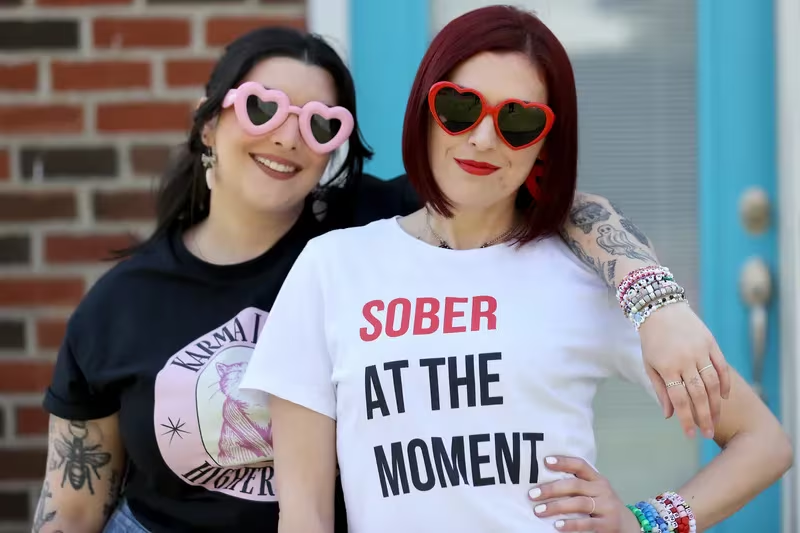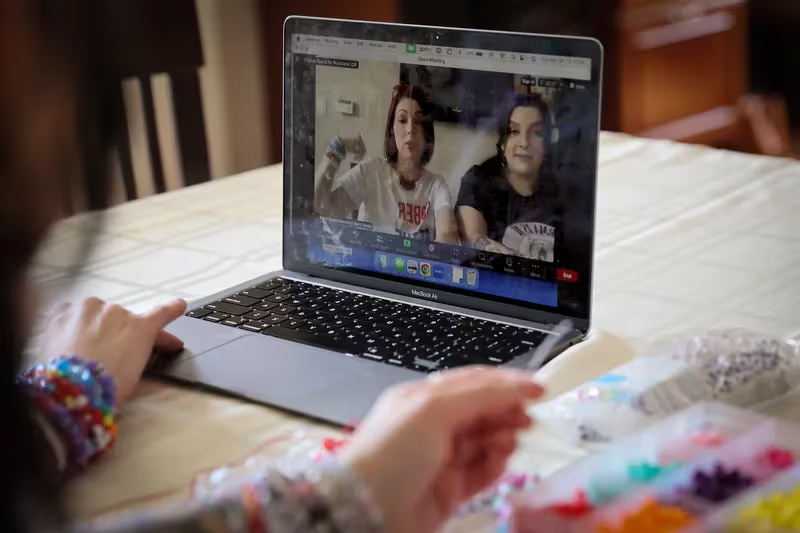Founded and facilitated by Northeast Philly Peer Mentor Julianne Griffin’s, Swift Steps uses a blend of Taylor Swift’s songs, lore, and guest speakers to create a space for genuine connections, open conversations, and healing.

On Zoom in a meeting pulsating with the energy of over a dozen Swifties navigating the twists and turns of recovery, Julianne Griffin opens each Saturday morning meeting by reciting a song. This Saturday, they dissected the lyrics of Taylor Swift’s “Style.” Each line, loaded with meanings personal and universal, resonating deeply with the group:
Midnight
Taylor Swift
You come and pick me up, no headlights
Long drive
Could end in burning flames or paradise
Fade into view, oh
It’s been a while since I have even heard from you (heard from you)
The lyrics take on a new meaning when viewed from the lens of recovery. When you change the subject from a lover to an urge, or a risky behavior, such as an urge to drink. Interpreting “could end up burning flames or paradise” as giving into the urge, or to resist? The lyrics give the group a way to empower them in their journey with substance use and their path towards healing.
For Griffin, founder of Blank Space Recovery, the verse wasn’t just about a post-breakup dalliance; it symbolized the internal battles of self-sabotage and the relentless pull of addiction. Blank Space Recovery Hosts Swift Steps, a virtual support group tailored for Swifties in recovery, a community that has rapidly swelled to 700+ members on Facebook since its inception earlier this year.
The group’s virtual meetings held four times weekly on Tuesdays, Thursdays, Saturdays, and Sundays, blend Swift’s lyrics, fan lore, and guest speakers to take the often times difficult conversations of recovery, from overcoming the monotony in developing healthy routines to confronting personal flaws. Beyond their online support groups, Swift Steps’ Facebook group serves as a sanctuary where Sober Swifties from all corners of the internet can gather to dissect lyrics and connect with other members of the community.
What sets Swift Steps apart is its non-judgmental ethos, and their ability to provide a safe harbor for anyone navigating the times when “all of [their] tears ricochet” during a difficult day of being in early recovery. “It’s brilliant,” said Eric Zillmer, a psychologist who worked in hospital recovery units before becoming the director of Drexel University’s Happiness Lab. “People with substance use disorder can feel alone … so to create a platform where people feel comfortable sharing under a cultural phenomenon driven by authenticity is fantastic.”

The group’s strength lies their firm belief in offering multiple paths to and through recovery, echoing Swift’s own music, which has served as a lifeline for fans grappling with various forms of trauma, from illness to displacement. This reciprocity among Sober Swifties underscores the power of fandom as a catalyst for mutual support, notes Zillmer.
Griffin’s personal journey from addiction to certified peer specialist in the state of Pennsylvania (CPS) inspired the creation of Swift Steps, fueled by a vision of fostering a recovery community infused with the spirit of a Taylor Swift concert – inclusive and welcoming to all. For members like Cindy Shearer, who has been in recovery since 2022, the group’s camaraderie evokes a sense of belonging absent in traditional recovery circles, where judgment often lurks.
While Swift Steps may be pioneering the Sober Swiftie space, it draws on a rich tradition of online music fandoms serving as safe havens for marginalized voices. Online music fandoms have always been “a place where people make sense of stigmas,” according to Jessa Lingel, an associate professor of gender studies and communication at the University of Pennsylvania, where she researches digital culture.
Swift’s music recently elicited discourse around addiction after she referred to herself as a “functioning alcoholic” on “Fortnight,” the opening track on The Tortured Poets Department. Stigma can creep up in recovery communities such as Narcotics Anonymous and Alcoholics Anonymous, while effective at ushering in long-term sobriety, can also feel alienating towards individuals who use medically supported recovery (MSR) or those do not want to associate religion with their recovery.
“For some people, [12 step] lifts them up. For others it can be isolating,” said Zillmer. Griffin stopped attending 12-step meetings a year into her recovery. “I was told I wasn’t sober for using MSR,” Griffin said. She used MSR after overdosing on Dec. 13, 2015 — Taylor Swift’s birthday, which is also the 19th anniversary of Griffin’s father’s fatal overdose.

For Griffin, Swift Steps isn’t just about overcoming addiction; it’s about reclaiming agency and rewriting one’s narrative, much like Swift herself has done. Through shared experiences and a mutual love for Swift’s music, members forge bonds that transcend addiction, offering hope and healing in equal measure.
As Swift’s melodies continue to soundtrack their recovery journey, Sober Swifties at Swift Steps find solace in the notion that they’re not alone, that within this community, their stories matter, and their struggles are met with empathy and understanding. In the symphony of recovery, they’ve found a melody uniquely their own, guided by the unwavering spirit of Taylor Swift herself.
Learn More about Blank Space Recovery
Facebook: Swift Steps

WALK YOUR TALK: Decoding Taylor Swift’s Iconic Style: My Name is Harley Skorpenske and I am a Sober Swiftie « The Sober Curator

Make sure to use our SOBER SWIFTIE stickers on Giphy! Available on the Giphy App, and Instagram Stories + Reels, & TikTok
A Disco Ball is Hundreds of Pieces of Broken Glass, Put Together to Make a Magical Ball of Light. You are NOT Broken, Friend. You are a DISCO BALL!

Resources Are Available
If you or someone you know is experiencing difficulties surrounding alcoholism, addiction, or mental illness, please reach out and ask for help. People everywhere can and want to help; you just have to know where to look. And continue to look until you find what works for you. Click here for a list of regional and national resources.







